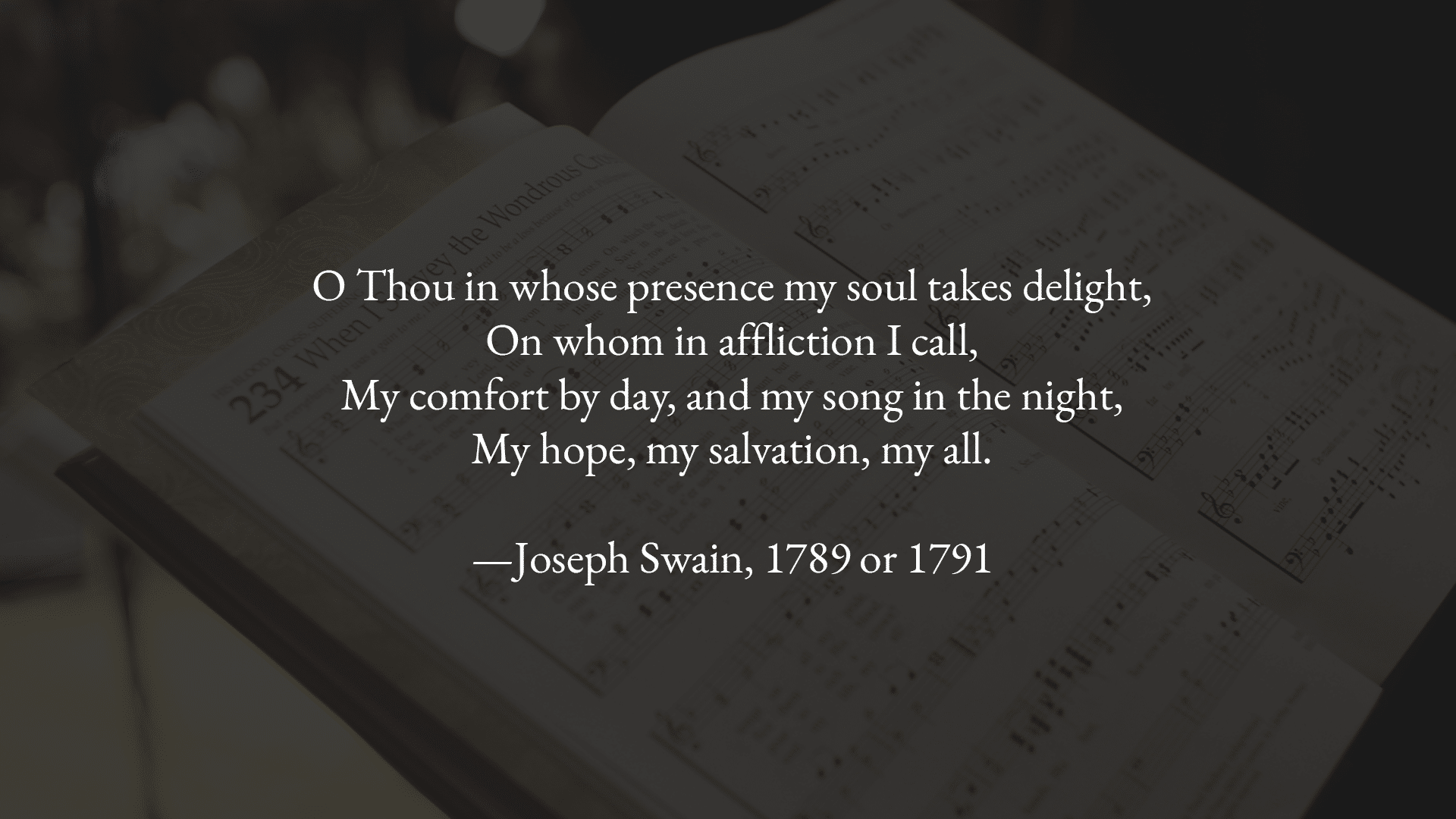Proverbs 25:20 says, “Whoever sings songs to a heavy heart is like one who takes off a garment on a cold day, and like vinegar on soda.” Singing the wrong song to a person dealing with grief, loss, or other challenging circumstances will only exacerbate the situation. But are there songs that would be just the right thing for a troubled person to hear?
One such hymn that speaks hope and peace to the suffering soul is “O Thou in Whose Presence” by 18th-century British Baptist Joseph Swain. Swain was born in Birmingham, England, but moved to London as a young man to work as an apprentice to an engraver. It was here that he came to faith in Christ, and began to express his newfound faith in poetic form. Swain was baptized by John Rippon, pastor of the historic Carter’s Lane Baptist Church, in 1783. Eight years later, Swain became a pastor himself, leading a Baptist church in the Walworth area of London. By all accounts, the Lord prospered his ministry over the next five years. However, Swain contracted an illness that claimed his life at age 35. As one ministering outside the Church of England, Swain was considered a non-conformist, and was buried in Bunhill Fields, the burial place of other notable non-conformists such as Daniel Defoe, John Bunyan, and Isaac Watts.
Most of Swain’s hymns have been forgotten,1According to the data at hymnary.org, Swain’s hymn “How Sweet, How Heavenly Is the Sight” appears in 564 hymnals, but the most recently published one is from 1969. but “O Thou in Whose Presence” is one that has survived, perhaps because of its association with the plaintive and haunting tune DAVIS, by American surveyor and amateur musician Freeman Lewis. The combination of text and tune provides a thoughtful meditation on the presence of God in the life of the believer and the hope found in Him alone.
The hymn opens, as many Psalms also do, with an acknowledgement that God is our only source of hope, comfort, and delight. But, as the next two stanzas indicate, the situation “on the ground” seems very different—the poet weeps in the valley of death, wanders in the wilderness, and starves in the desert. His foes will rejoice over his fall, and all seems lost.
Swain’s original text contains five stanzas (not printed below, but available here) in which he engages in the all-too-common practice of earlier generations of interpreting the Song of Solomon as an allegory of Christ and the Church. Most modern hymnals omit these stanzas, and nothing is lost in the flow of thought (as long as the “He” is understood to refer to Jesus) to move to the final two stanzas of Swain’s original poem.
The penultimate stanza begins with a “But God” moment (cf. Rom 5:8, Eph 2:4, et al.). In the face of alienation, desperation, depression, and hostility, He looks; He speaks. All is not lost. The angels await God’s command to spring to the believer’s aid (Heb 1:14). When God speaks, eternity echoes back His voice as praise to Him.
How do we respond to this love, this care, this attention that our Good Shepherd gives to us? Our reasonable act of worship is to give ourselves to Him (Rom 12:1). We know His voice when we hear it (Jn 10:3–5, 16, 27–28), and we follow. Our only hope for restoration, defense, and healing is in Him. He is our All, and His care enables us to rejoice, even in the face of danger and trouble.
Composer Peter Anglea has written a beautiful arrangement of this hymn for SATB choir. The text also sometimes appears with the American folk tune SAMANTHRA with some additional stanzas added, such as in this arrangement by Sondra K. Tucker.
As Paul recounts his inner turmoil after sending his painful letter to the Corinthian church, he says, “For even when we came into Macedonia our flesh had no rest, but we were afflicted on every side: conflicts without, fears within. But God, who comforts the depressed, comforted us”22 Cor 7:5–6, NASB1995—in this case, by the good report that Titus brought of how the Corinthians had responded. The same God who comforted the depressed Paul and his companions offers His peace to us as well. Jesus, our good Shepherd, not only leads His flock with love but also gave His life for His sheep.
“What then shall we say to these things? If God is for us, who can be against us? He who did not spare his own Son but gave him up for us all, how will he not also with him graciously give us all things?” (Rom 8:31-32).
O Thou in whose presence my soul takes delight,
On whom in affliction I call,
My comfort by day, and my song in the night,
My hope, my salvation, my all.
Where dost Thou, dear Shepherd, resort with Thy sheep,
To feed them in pastures of love?
Say, why in the valley of death should I weep,
Or alone in the wilderness rove?
O why should I wander an alien from Thee,
And cry in the desert for bread?
Thy foes will rejoice when my sorrows they see,
And smile at the tears I have shed.
He looks, and ten thousands of angels rejoice,
And myriads wait for His word;
He speaks, and eternity, filled with His voice,
Re-echoes the praise of the Lord.
Dear Shepherd, I hear and will follow Thy call;
I know the sweet sound of Thy voice.
Restore and defend me, for Thou art my all,
And in Thee I will ever rejoice.
—Joseph Swain, 1789 or 1791
References



